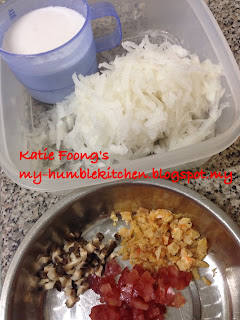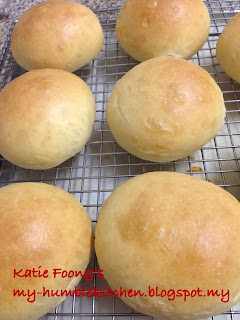My Nonya Chang
has lost its glamorous blue colour!
Traditional Nonya Chang has a distinctive sweet and savoury taste
with a patch blue glutinous rice
coloured with blue pea flower juice.
Was my blue pea flower juice too diluted
or
was it the reflections
that make it lost its glamour?
I know it is definitely my fault.
I refer to Mykitchen101en for the recipe
and followed very closely.
First, I started with the spices.
Since I was told that this recipe is rather spicy,
I reduced the spices to 1/2!
If you are curious, here is how I did it...
Spices:
I used 1/2 of the following amount
25g coriander seed
20g white pepper seed
1. combine both seeds in a frying pan
2. stir fry until fragrant 5-6 min, let cool
3. blend the seeds until fine, sift & discard any coarse leftover
Pork Filling:
450g skinless pork belly, diced
30g mushroom, soaked & diced
110g winter melon sugar, diced
4 Tbsp cooking oil
60g chopped shallots
40g chopped garlic
35g minced bean paste/taucu
40g sugar
Note:
to make dicing easier, blanch the pork belly in hot water for 2 min to firm up
1. preheat frying pan, add oil & fry shallots & garlic until golden brown
2. add bean paste & cook until fragrant
3. add pork, cook until the outer layer turns white
4. add mushroom & continue cooking for 1 min
5. add spices gradually, mix well
6. add winter melon & season to taste
7. divide the filling into 12 equal parts
Ingredients for Glutinous rice
500g glutinous rice, soaked for 4 hours, drained
1 Tbsp cooking oil
25g chopped shallots
1 tsp fine salt
200ml mushroom soaking water
3 Tbsp thick blue pea flower juice
1. preheat frying pan, add cooking oil, fry shallots until fragrant
2. add glutinous rice and cook for 1 min
3. add salt to mushroom soaking water, mix well
4. add this water gradually to glutinous rice while stir frying
5. cook until water has dried up
6. dish out 600g of rice, divide into 12 portions
7. add blue pea flower juice to the remaining rice & cook until dry
8. divide into 12 portions too
Wrapping:
24 pc bamboo leaves, soaked & cleaned
some strings to tie, soaked
6 pieces pandan leaves, cut into halves
1. fold 2 pieces bamboo leaves into a cone, add 1 pandan leaf
2. put one portion of blue colour rice into the cone, press down
3. add with one portion of the filling
4. top with a layer of white rice
5. use a wet hand to press the rice until firm
6. fold to shape & tie with a string
Cooking:
1. bring a large pot of water to the boil
2. put in the dumplings, the water level must be higher than the dumplings
3. bring to a boil again, reduce to medium heat, cover & cook for 2 hours 30min
4. if using the pressure cooker, use bean function.
Notes:
1. cooled dumplings should be refrigerated
2. can be freezed up to 3 months








































